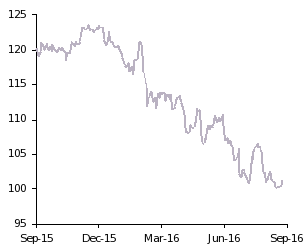Economic Commentary
September 21 is shaping up to be a big day for central banks. Both the US Federal Reserve (Fed) and the Bank of Japan (BoJ) are making monetary policy decisions on that date. The probability of a Fed rate hike has been rising with markets currently attaching a probability of 34% for a September rate hike, up from near 0% at the end of June. In contrast, the BoJ may ease monetary policy as activity has slowed and inflation has fallen. Whether the divergence in monetary policy will begin in September or not is up for debate. What is more certain is that,going forward, the monetary policies of these two major economies are likely to move in opposing directions.
Japan was mired in a deflationary cycle for two decades, but since late 2012,the incoming prime minster, Shinzo Abe, began his new economic policy to improve growth, fix public finances and overcome deflation. The initial outcomes of ‘Abenomics’ were promising. However, the Japanese economy seems to have stalled more recently. GDP growth was 0.2% in Q2 and headline year-on-year inflation was negative (-0.4%) in July. Low inflation seems to be a persistent issue in Japan rather than an outcome of temporary factors such as falling international prices of food and oil. Excluding food and energy, inflation was only 0.3% in July.
One of the main reasons behind the recent disappointing performance of the economy is the sharp appreciation of the Japanese yen which has strengthened by around 17% against the US dollar so far this year. Exports play a large role in the Japanese economy so a stronger yen tends to erode competitiveness and weaken growth. Additionally, the stronger yen makes imports cheaper, reinforcing the deflationary cycle.

Sources: Reuters, Haver Analyticsand QNB Economics
The yen has appreciated for two main reasons. First, safe haven inflows to Japan. In January and February concerns about global growth and devaluation of the Chinese currency led to safe haven flows into Japan. Japan received another bout of safe haven flows following the Brexit vote in June.These safe haven flows led to a stronger yen, hampering Japan’s competitiveness and exports.
Second, the BoJ has disappointed markets by easing policy less than expected. Since introducing negative interest rates in January, the BoJ has kept its main monetary policies on hold, despite market expectations for more easing. As a result, the yen strengthened after each policy decision in March, April, June and July. The BoJ may have run out of room to ease policy. Short-term interest rates are already at -0.1% and long-term government bond yields are already close to or below zero (10-Year is-0.07% and 40-Year is 0.44%).This has reduced the scope for the BoJ to lower interest rates much further by cutting short-term rates or reducing long-term bond yields through quantitative easing.
Nonetheless, going forward, these factors are likely to be overpowered by monetary policy in the US. We expect the Fed to raise interest rates this year as inflation and unemployment are near targeted levels (see our economic commentary from last week, Conditions are ripe for one Fed rate hike in 2016). Currently, a Fed rate hike is not fully priced into financial markets—the implied probability from interest rate futures for one rate hike this year is 59%. As a result, if the Fed does hike rates, it would likely lead to a weaker yen against the US dollar.
In Japan, the BoJ is currently reviewing the impact of its monetary policies on the economy. The results of the review will be published on September 21 and could pave the way for further easing measures to boost inflation and growth. Further easing would likely weaken the yen, supporting exporters and pushing up import costs and inflation. It would also aim to revive investment and consumption. However, given the limitations on the BoJ with interest rates near zero, the economy may have to rely on a more expansionary fiscal policy to make a significant impact on growth. The recently announced USD45bn fiscal stimulus package is a positive move in this direction.
